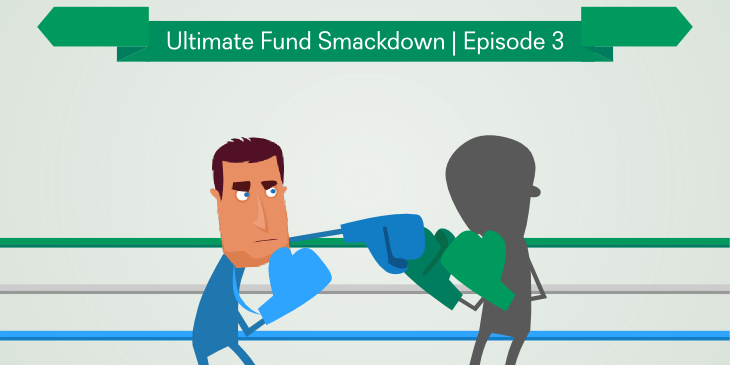There has been plenty of talk about whether actively managed mutual funds are worth the fees they charge. There are many people on either side of the argument. The proponents of active management argue that active managers can add value by selecting the best securities to own or by tactically shifting the asset allocation of the fund.
The growing list of opponents argue that net of fees, investors are better off in a low-cost portfolio of ETFs or index funds.
To find the answer, we put some of the largest and widely held Canadian mutual funds in the ring with a low-cost Modern Potfolio of ETFs and let them battle it out until one wins.
In the last two episodes, the Modern ETF Portfolio easily beat its opponents, the Investors Canadian Equity Fund A and the CIBC Monthly Income Fund. In this episode, we challenge Desjardins Canadian Equity Value Fund to a duel.
Rules of Engagement
For each smackdown, we construct a low-cost, Modern ETF Portfolio that closely matches the historical average asset allocation of the incumbent mutual fund. We put the two investments against each other to see which one reigns supreme. Our assumptions are:
- The initial investment in each portfolio is $25,000
- Trading commissions of $9.95 to buy and sell ETFs, no fees for trading the mutual fund
- Dividends are reinvested at no cost
- The Modern ETF portfolio is rebalanced once per year
We will look at the past performance of the two investment options in terms of their Sharpe Ratio (portfolio returns minus the risk-free rate divided by the standard deviation of returns) over 3, 5, and 10-year periods to determine the winner.
Meet the Players
Modern ETF Portfolio
Desjardins Canadian Equity Value Fund
Fund Expenses
0.07%
Fund Expenses
2.57%
Asset Allocation
Asset Allocation
Canadian Equities (XIC)
US Equities (XSP)
Cash
Canadian Equities
US Equities
Cash
Let the Games Begin
First we look at how the two contenders performed in the past:
Modern ETF Portfolio’s past performance is based on a computer-generated back-test using the assumptions outlined below. For ETFs that do not have a long enough history, we use the underlying index’s total return minus the ETF’s annual MER.
$25,000 invested in the Modern ETF portfolio 10 years ago would be worth $50,374 at the end of March 2015, while $25,000 invested in Desjardins Canadian Equity Value Fund would be worth only $41,457. Investors in the Modern ETF portfolio would have $8,917 more in their pockets today compared to investors in Desjardins Canadian Equity Value Fund.
Below is a summary of annualized risk and return statistics for each of the contenders in the last 3, 5, and 10-year periods:
| Modern ETF Portfolio | vs. | Desjardins Canadian Equity Value Fund | ||||||
|---|---|---|---|---|---|---|---|---|
| Risk | Return | Sharpe Ratio | Winner1 | Winner1 | Sharpe Ratio | Return | Risk | |
| 8.21% | 9.29% | 1.02 | Round 1 3-year Performance |
0.72 | 7.48% | 9.37% | ||
| 9.69% | 7.11% | 0.67 | Round 2 5-year Performance |
0.40 | 5.24% | 12.32% | ||
| 13.49% | 7.49% | 0.46 | Round 3 10-year Performance |
0.29 | 5.19% | 14.97% | ||
1The winner of each round is the portfolio with the highest Sharpe Ratio, which is a measure of risk-adjusted returns. Sources: Morningstar Direct and ModernAdvisor’s calculations.
The Champion is:

The Modern ETF Portfolio defeated the Desjardins Canadian Equity Value Fund by winning all three rounds by a wide margin!
If you are invested in the Desjardins Canadian Equity Value Fund, you are risking your financial well-being by paying outrageous fees for an underperforming fund. You might want to switch to a low-cost ETF portfolio and save yourself thousands of dollars in fees and significantly improve your investment returns.
If you need more information on how you can implement a low-cost ETF portfolio, send us an email, and we will be glad to walk you through the steps.
